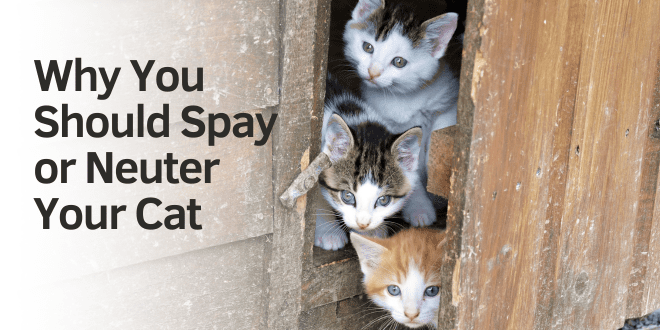
The decision to spay or neuter your cat will be one of the biggest decisions you make regarding your cat’s health and welfare as well as the welfare of other cats. The pet overpopulation problem is devastatingly serious and animals are being put to death every day because shelters simply don’t have the room. Healthy animals are put to death because people don’t act responsibly. According to the ASPCA, seven out of ten cats are put to death simply because there’s no one to adopt them.
Some people may feel as long as they keep their cats indoors there’s no risk to having them remain intact. Pet overpopulation isn’t the only reason to spay or neuter your cat. There are health concerns and behavioral implications as well.
What Happens if You Don’t Neuter Your Male Cat
If you’re under the impression keeping your male cat intact is the kinder choice, you’re dooming your cat to a life of frustration and being at the mercy of hormones. Intact male cats will spray. They will be on a mission to roam, increase their territory, find a mate, and fight competitors. If your cat is an indoor kitty then that behavior will be directed at companion cats. The spraying will be directed at your furniture and belongings.
Don’t assume just because your cat lives exclusively indoors he won’t contribute to overpopulation or endure any of the suffering associated with life outdoors as an intact cat. Cats escape from their homes every day. Your cat could easily slip out the door.
If you allow your cat outdoors then you’ll put him at risk of injury or even death as he fights other males while in search of a female in heat. Intact males tend to roam beyond their usual territory to search for females. Your cat may enter into the territory of a rougher and tougher male and the end result of that fight could be tragic.
Cat fights often end with abscesses. A cat’s canine teeth are very sharp and if your cat is bitten, the wound may seal over, leaving bacteria trapped inside. This leads to infection and it’s very painful. With abscesses, it’s often necessary for the veterinarian to leave the wound open with a surgical drain while the infection clears. There is so much suffering involved with cat fights that could easily be avoided by neutering your cat and keeping him indoors.
An intact male will mate and the result adds to pet overpopulation. If the female with whom he mates is a stray cat, then those kittens will likely also live an outdoor life and grow up intact where they will continue to mate.
The more your intact outdoor male fights and mates, the more he is at risk of contracting disease as well as spreading disease.
Intact males are at risk of developing certain cancers later in life. Neutering your young male will eliminate the risk of testicular cancer and greatly reduce the risk of prostate disease.
What Happens if You Don’t Spay Your Female Cat
As with the description above about life for an outdoor male, an outdoor female will endure fights and repeated mating. The feline mating process is not a pretty one – it’s violent and extremely stressful. It also puts the cat at risk of contracting disease as well as spreading disease. Giving birth, especially if your cat is very young, can pose a health risk to her as well.
An unspayed indoor cat will vocalize, try to escape, and become a victim of hormones. Life for an unspayed adult female cat is filled with stress. It’s also very stressful for everyone else in the family. She will not be a pleasant companion to live with. She’ll also attract every intact male in the neighborhood. You may find yourself dealing with cats who are spraying outside your windows or fighting in your backyard because they know there’s a cat in heat close by.
Repeated heat cycles are also very stressful on a cat’s body. If your cat is spayed before her first heat cycle you reduce or eliminate the risk of mammary, ovarian and uterine cancer.
Be Responsible
There is simply no excuse for not spaying or neutering your cat. If budget is a concern, you can find out about low-cost spay/neuter clinics in your town. If you haven’t already adopted a cat then consider adopting one who is already spayed or neutered so that won’t be an expense you’ll have to face.
For the parents who feel it’s cute to have your children experience the miracle of birth by having your female get pregnant, it would be much better to show your children what being a responsible pet parent means. Teaching them to be caring, responsible, kind, and attentive to animals will be a greater life-long lesson than having them watch a cat deliver six kittens that will likely end up in a shelter, outdoors, or dead.
Neuter and Spay Surgery
If you’re concerned about the surgical risk associated with neutering or spaying, the surgery is very low risk.
The surgery for male cats involves the removal of the testicles by way of an incision in the scrotum. No sutures are required and post-op care involves monitoring to make sure the healing incision stays clean and dry. Your cat will go home the morning after the surgery.
The surgery for females consists of removing the uterus, tubes and ovaries through an abdominal incision. The few sutures across your cat’s shaved abdomen are removed about ten days post-op.
Need More Information?
If you have any questions about spaying your neutering your cat, talk to your veterinarian. Your veterinarian can guide you on when the right time to neuter or spay would be for your individual cat.
For more information on cat behavior and training, refer to the best-selling books by Pam Johnson-Bennett. Her books are available at bookstores and also online. We’ve included links to Amazon here on our website.
If you have a question regarding your cat’s behavior or health, please contact your veterinarian. This article is not intended as a replacement for your cat’s veterinary care. This article is for information purposes only and not offering medical advice or providing a medical diagnosis.




